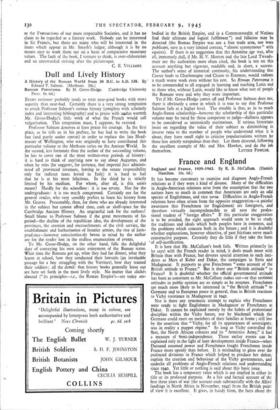Dull and Lively History
A History of the Roman World from 30 B.C. to A.D. 138. By Edward T. Salmon. (Methuen. 20s.) Roman Panorama. By H. Grose-Hodge. (Cambridge University Press. 8s. 6d.)
EVERY reviewer probably tends to treat near-good books with more asperity than near-bad. Certainly there is a very strong temptation to attack Professor Salmon's serious history (complete with scholarly index and interesting bibliography) and to praise with undue warmth Mr. Grose-Hodge's little work of what the French would call vulgarisation. This temptation must, I suppose, be resisted.
Professor Salmon deserves at least praise for courage. In the first place, as he tells us in his preface, he has had to write the book fast (and partly under canvas) in order to replace the late Headmaster of Wellington who was originally to have contributed this particular volume to the Methuen series on the Ancient World. In the second, less fortunate than the author of the succeeding volume, he has to coVer one of the most written-over periods of history: it is hard to think of anything new to say about Augustus, and when he tries (he suggests, for instance, that imperial fisci administered all provincial revenues, leaving to the senate responsibility only for indirect taxes levied in Italy) it is hard to feel that he is at his most felicitous. In the third he is strictly limited by his medium. For whom, after all, is this series meant? Hardly for the schoolboy : it is 'too severe. Nor for the undergraduate : it is too much compressed. Certainly not for the general reader, who very sensibly prefers to learn his history from Mr. Graves. Presumably, then, for those who are already interested in the subject but cannot afford time, cash or shelf-space for the Cambridge Ancient History. An ungrateful task for the authors! Small blame to Professor Salmon if the great movements of his period—the decline of the republican idea, the development of the provinces, the creation and encroachments of the civil service, the establishment and barbarisation of frontier armies, the rise of jurisprudznce—however conscientiously borne in mind by the author are for the reader lost in the endless enumeration of events.
To Mr. Grose-Hodge, on the other hand, falls the delightful duty of conveying his own acute enjoyment of the Roman scene. What time the Romans got up, what they had for dinner, what they learnt at school, how they conducted their lawsuits (an invaluable passage for a boy struggling with the Verrines), how they trained their soldiers : all the detailT that history books generally leave out are here set forth in the most lively style. No matter that cliches
bodied in the British Empire, and in a Commonwealth of Nations find their ultimate ind logical fulfilment") and fallacies may be detected (the Roman Empire was not a free trade area, nor were pub/icon, save in a very limited context, "almost synonymous" with equites). If there is no suggestion that the Antonine age was, after all, immensely dull, if Mr. H: V. Morton and the late Lord Tweedsmuir are the authorities most often cited, the book is not on this account anything but vigorous, readable and, in short, a success. The author's sense of historical continuity, .his understanding that Caesar leads to Charlemagne and Cicero to Erasmus, would redeem a much worse work even without his zest. So Roman Panorama is to be commended to all engaged in learning and teaching Latin and to those who, without Latin, would like tO know what sort of people the Romans were and why they were important.
Yet if Mr. Grose-Hodge comes off and Professor Salmon does Mt, there is obviously a sense in which it is true to say that Professor Salmon fails at a higher level. The trouble is that, as in so much Anglo-Saxon scholarship—however the scholarship of this particular volume may be rated by those competent to judge--dullness appears to be considered as intrinsically meritorious. If serious historians insist on regarding the value of their subject as diminishing in inverse ratio to the number of people who understand what it is about, they have small right to criticise popularisations written by those less strictly scrupulous than they. Let them descend, following the excellent example of Mr. and Mrs. Hawkes, and do the job






















 Previous page
Previous page